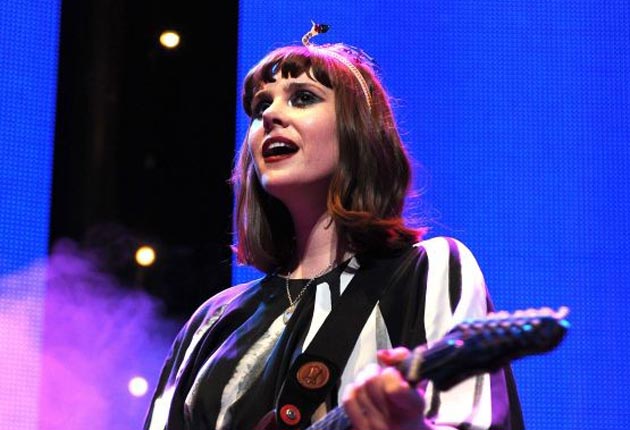Kate Nash launches scheme to get girls into songwriting

Your support helps us to tell the story
From reproductive rights to climate change to Big Tech, The Independent is on the ground when the story is developing. Whether it's investigating the financials of Elon Musk's pro-Trump PAC or producing our latest documentary, 'The A Word', which shines a light on the American women fighting for reproductive rights, we know how important it is to parse out the facts from the messaging.
At such a critical moment in US history, we need reporters on the ground. Your donation allows us to keep sending journalists to speak to both sides of the story.
The Independent is trusted by Americans across the entire political spectrum. And unlike many other quality news outlets, we choose not to lock Americans out of our reporting and analysis with paywalls. We believe quality journalism should be available to everyone, paid for by those who can afford it.
Your support makes all the difference.Singer-songwriter Kate Nash plans to address the under-representation of female songwriters in British music by launching a series of "after-school music clubs" for British schoolgirls.
London-born Nash is collaborating with schools nationwide next week to launch her "Rock and Roll After-School Music Club", in an attempt to galvanise songwriting interest among female secondary school pupils.
The singer will visit her own school – Avonbourne Girls School in Bournemouth – on Wednesday, to address pupils, with the aim of setting up a permanent songwriting club.
Despite the prominence of Nash and other female British singers such as Lily Allen, Jessie J and Florence Welch, currently only 14 per cent of the 75,000 members of the Performing Rights Society (PRS), which collects and pays songwriting royalties in Britain, is female.
"A lot of women in pop aren't writing their own songs and there is this preconception that women are meant mainly as performers," Nash said. "A lot of people still ask me whether I write my own material, as if women are not capable of doing it. That is damaging to people's reputation."
Nash also pointed out the relatively small number of female artists featured on the front cover of mainstream music magazines. She said she intended to make presentations, show videos of interviews with singer-songwriters and take questions at a number of schools, before spearheading the foundation of "grass-roots after-school clubs" involving visits by prominent women from the music industry.
Nash has already successfully trialled a similar campaign in the United States. Earlier this month she held a workshop in New York, at which she performed songs and discussed how pupils could develop their songwriting skills.
Nash is supported by US music education organisation Music Unites – which has aided in the donation of 32 guitars – and The Co-operative.
"I feel like I am complaining the whole time and I want to stop; it's about showing people a path and saying: 'You can totally do this'," she continued. "It can be as simple as talking about what I've done. People need to be told they can be themselves; a little bit of encouragement; to be told that they are worth something."
Enjoy unlimited access to 100 million ad-free songs and podcasts with Amazon Music
Sign up now for a 4 month free trial (3 months for non-Prime members)
Enjoy unlimited access to 100 million ad-free songs and podcasts with Amazon Music
Sign up now for a 4 month free trial (3 months for non-Prime members)
In November author Nick Hornby launched the Ministry of Stories literacy programme in east London in a similar attempt to encourage school children to read and write more.
Nash's debut album Made of Bricks was released in 2007 and went platinum, winning her the Brit Award for best female solo artist. Last year she released her second album, My Best Friend is You. Single "Do-Wah-Doo" reached number 15 in the charts.
"There is more than one way for a woman to be sexy and that doesn't have to be our purpose in life," Nash said. "I thought back to when I felt most insecure about myself and about what changed that and how. It was being a teenage girl and thinking I had to look and act in a certain way that had me feel terrible and unworthy."
However PRS chief executive Robert Ashcroft said that, of the 10,218 people who joined the organisation last year, an above-average 16 per cent were female.
"The music business has traditionally been very male-dominated, but this is starting to change and we've seen an increase in the number of young female music creators who are joining PRS," he said.
"It's important new female talent is supported and the industry strives to become more representative."
Join our commenting forum
Join thought-provoking conversations, follow other Independent readers and see their replies
Comments